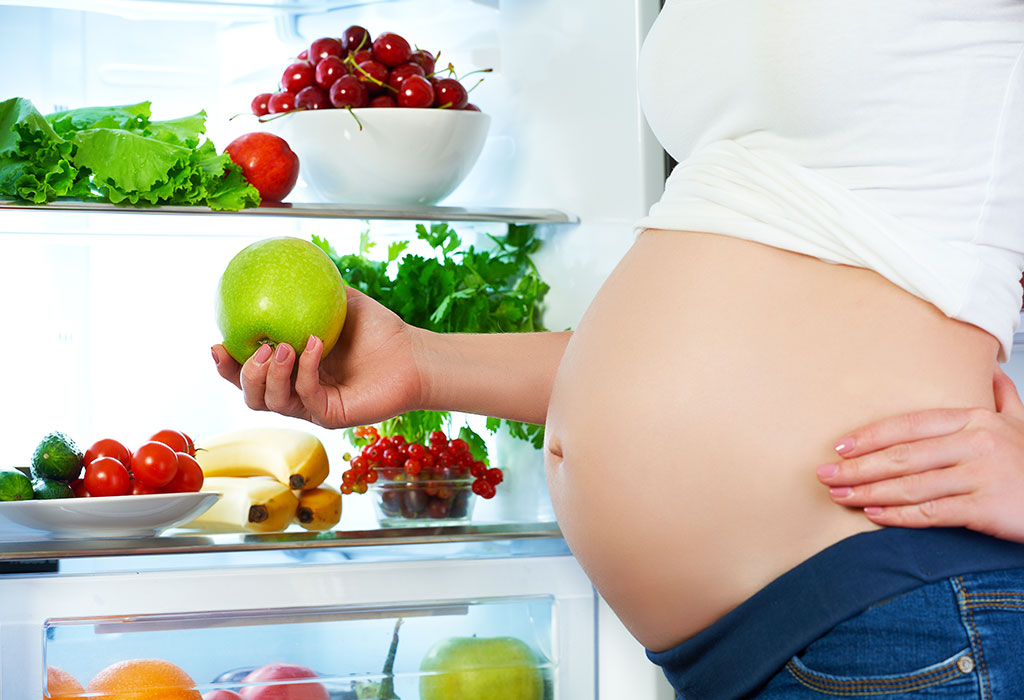Pregnancy Hunger – Causes & Solutions
Understand what causes pregnancy hunger, why it increases, and how to manage cravings with healthy, satisfying choices.

During pregnancy, hormonal changes play a pivotal role in triggering an increased appetite. If you’re faced with the question – is it normal to be extra hungry in early pregnancy, know that the surge in hormones, particularly human chorionic gonadotropin (hCG) and progesterone can lead to increased hunger during pregnancy. Many women notice that early pregnancy and hunger often go hand in hand because the growing baby’s nutritional needs increase your own. Expectant mothers need to focus on nutrient-dense foods to meet both their nutritional requirements and support the developing fetus. Maintaining a balanced diet with various food groups can help manage hunger while ensuring adequate nourishment. Let us see why and how hunger increases during pregnancy and how you can deal with it.
When Does Appetite Usually Increase During Pregnancy?
Hunger during pregnancy usually increases in the second trimester, but some women experience it as early as in the first trimester. But normally, it happens during the second trimester, as that is the time your morning nausea usually ends and hunger pangs start so you can regain the weight you lost in the first trimester (1).
Is It Normal to Have an Increased Appetite During Early Pregnancy?
You may notice an increased appetite in early pregnancy (2). This is because the levels of progesterone in your body are going up during the first trimester of pregnancy, because of which you will feel nauseous (leading to morning sickness) and elevated levels of hunger. Usually, after vomiting, you will feel sudden hunger pangs because your stomach has emptied. Aside from this, you are likely to feel hungry during pregnancy because your body needs the calories you lost when vomiting, and because your baby needs nutrition to grow inside your belly. During pregnancy, women have higher blood levels, which need calories to maintain themselves (3). This causes intense hunger and food cravings. This usually may happen between weeks 7 and 12, where you might start disliking foods you previously liked and develop cravings for other foods. Many women experience late-night hunger during pregnancy as well. This usually settles down at the end of the second trimester and is very normal.
Why Do You Feel Hungry All the Time During Pregnancy?
Feeling hungry all the time during pregnancy can feel a little strange, especially when the cravings hit out of nowhere. Your appetite may seem different from one day to the next, leaving you wondering what’s going on. Here are a few things that can help explain the connection between pregnancy and feeling hungry all the time (3).
- The number one cause of increased hunger during the second trimester of pregnancy is the growing foetus that requires nutrition to grow and develop properly.
- In addition, your body craves the extra calories to maintain the high blood levels in your body and other processes that are taking place during the gestation period.
- Hunger during the third trimester of pregnancy and during the end of the second trimester may also be due to milk production, as your body is getting ready for pregnancy.
Important Facts About Excessive Hunger
You will be eating for two people, but the important thing to remember is that you don’t have to eat gigantic portions all the time. Your foetus is far smaller than you and your portion sizes should be made accordingly. You should eat until your stomach is satisfied, and you absolutely can have your share of mini-meals and snacks during your pregnancy. But, to put it quite simply, don’t give into your cravings and overeat. Excessive fried chicken, samosas or birthday cake is not healthy for your baby or for you!
What Can You Do About Increased Appetite During Pregnancy?
Many women search for ways to manage early pregnancy increased hunger as their appetite suddenly shifts. Below are a few tips you can use to keep your hunger pangs at bay:
- Check Your Calorie Count: During the first trimester, most mothers don’t need extra calories. In the second trimester, you will need 350 more calories than your normal diet, which increases to 500 in your third trimester. Make sure you stick to it and not over-indulge (4).
- Avoid Dehydration: Sometimes, you might confuse dehydration with hunger as your body is working overtime and demanding more fluids during pregnancy. You will need to replenish the fluids in your body, so drink 12 to 13 cups of water a day – more so if you live in a warm climate and sweat a lot. Avoid sugary drinks like sodas, and stick to fresh juices or water (5).
- Eat Healthy Meals: Make sure your pregnancy diet is healthy and filling as opposed to just being filling. Have fresh, whole foods instead of processed or refined ones. For energy, pair whole grains or fruit with healthy fats (dairy or nut butter) and protein. You can try having meals which require more chewing as it will help you feel fuller. A huge salad bowl with nutrients and fibre will fill you up more than spaghetti (6).
- Carry Snacks: In case you are out and are suddenly hit by hunger pangs, carry a packet of nuts or trail mix that you can immediately reach out for instead of falling back on unhealthy junk food (7).
- Eat Frequent But Small Meals: Spread out your meals into mini-meals over three hours instead of eating huge amounts during each sitting. The latter will cause more bloating, gas and heartburn than you are already experiencing (8).
- Avoid Temptation: You can indulge once a week in your favourite food, but in general, avoid adding junk food to your shopping cart or your kitchen cabinet. Out of sight, out of mind.
- Watch Your Pregnancy Weight: You will inevitably gain weight during your pregnancy, so make sure that your eating habits do not contribute to it majorly. Eating junk food can cause weight gain along with other problems like diabetes or heart conditions if you are already susceptible to them, which can affect your pregnancy overall. So, if you notice that you are gaining weight way too fast, check with your doctor to see the underlying cause.
- Incorporate Mindful Eating: Pay attention to your body’s hunger and fullness cues. Practice mindful eating by savouring each bite and staying aware of hungriness in early pregnancy and how your body signals it. This can help prevent overeating and promote a healthier relationship with food during pregnancy.
What Are Hunger Pangs?
Hunger pangs are sensations or discomfort in the abdominal region signalling the body’s need for food. They are often characterised by a gnawing or empty feeling in the stomach, accompanied by stomach growling, and indicate a drop in blood sugar levels, prompting the individual to eat and satisfy their nutritional needs. If you’re dealing with hunger pain pregnancy concerns, know that this feeling is often a normal part of early changes (9).
What Are the Causes of Hunger Pangs in Pregnancy?
Experiencing hunger pangs during pregnancy is a common occurrence, often attributed to a combination of physiological changes and increased nutritional demands. Several factors contribute to these sensations, and understanding them can help expectant mothers manage their dietary needs effectively.
1. Hormonal Fluctuations
The surge in hormones, including human chorionic gonadotropin (hCG) and progesterone, plays a significant role in stimulating appetite and causing hunger pangs (10).
2. Increased Metabolic Rate
Pregnancy leads to an elevated metabolic rate as the body works harder to support the growing fetus. This heightened metabolism can result in more frequent feelings of hunger.
3. Nutritional Demands of the Fetus
The developing fetus requires a substantial amount of nutrients for growth and development, leading to an increased appetite in the mother to meet these demands (9).
4. Blood Sugar Fluctuations
Changes in blood sugar levels, especially a drop in glucose, can trigger hunger pangs. Pregnant women may experience fluctuations due to the body’s altered insulin sensitivity.
5. Emotional and Psychological Factors
Pregnancy often brings about emotional and psychological changes, and stress or anxiety can contribute to an increased desire for food, leading to hunger pangs.
Can You Take Appetite Suppressants to Help Yourself Feel Less Hungry During Pregnancy?
Using appetite suppressants, diet pills, or weight loss medications is not considered safe during pregnancy. It is recommended to consult with your obstetrician to address concerns. Your healthcare provider can:
- Provide guidance on distinguishing between psychological hunger and physical hunger.
- Monitor your hydration levels and offer advice on the appropriate daily water intake.
- Recommend nourishing meals and healthy snacks that contribute to weight management and provide essential nutrients for both you and your baby.
- Offer guidance for a healthy diet that supplies the necessary nutrients and energy to support a healthy pregnancy.
- Ensure you receive sufficient additional calories to fulfill both your nutritional needs and those of your baby.
- Suggest foods that are both nutritious and appealing, especially when dealing with pregnancy-related issues such as heartburn, indigestion, or constipation.
FAQs
1. Is constant hunger a signal of pregnancy?
If you’re wondering – is an increased appetite a pregnancy sign? Yes, constant hunger can be a signal of pregnancy. Hormonal changes and increased metabolic demands during pregnancy can lead to heightened sensations of hunger.
2. Can hunger pangs in pregnancy affect your mental health?
Hunger pangs in pregnancy can contribute to fluctuations in mood and energy levels, potentially impacting mental well-being. Maintaining a balanced diet and addressing nutritional needs is essential for overall mental health during pregnancy.
3. How do hunger pangs impact your baby’s health when pregnant?
Hunger pangs, if not addressed through proper nutrition, can affect the baby’s health by potentially depriving them of essential nutrients. It underscores the importance of maintaining a healthy and well-balanced diet to support both maternal and fetal well-being during pregnancy.
4. Does feeling less hungry later in pregnancy mean something is wrong?
Not usually. As the baby grows, your stomach may have less room, leading to smaller meals and reduced appetite. If appetite loss is severe or sudden, consult your doctor.
If you’re experiencing a change in appetite in early pregnancy or constant hunger in the first trimester, know that it is normal. Your appetite may gradually decrease in the third trimester, but until then, if you’re dealing with constant hunger while pregnant, try the tips above to manage those pregnancy hunger pangs like a pro. Remember to consume high-quality food as you increase your food intake so it does not cause you more problems.
Also Read:
Too Much Sleep in Pregnancy
Excessive Sweat while Pregnant
Loss of Appetite during Pregnancy
Effects of Overeating during Pregnancy
Was This Article Helpful?
Parenting is a huge responsibility, for you as a caregiver, but also for us as a parenting content platform. We understand that and take our responsibility of creating credible content seriously. FirstCry Parenting articles are written and published only after extensive research using factually sound references to deliver quality content that is accurate, validated by experts, and completely reliable. To understand how we go about creating content that is credible, read our editorial policy here.
1. Eve Medical of Miami – Appetite Changes During Pregnancy: What to Expect Each Trimester
3. Apollo Cradle – Increased Appetite Early Pregnancy
4. Centers for Disease Control and Prevention – Weight Gain During Pregnancy
5. American College of Obstetricians and Gynecologists – Nutrition During Pregnancy
6. Family Health Centers of San Diego – An Essential Guide on What to Eat During Pregnancy
7. U.S. Department of Health and Human Services – Eat Healthy During Pregnancy: Quick Tips
8. NHS – Indigestion and heartburn in pregnancy





































